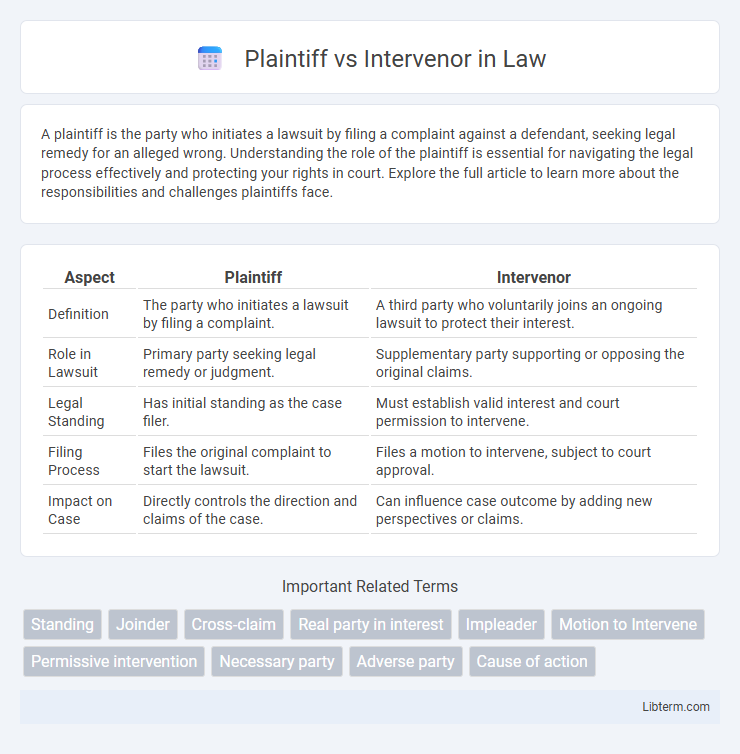A plaintiff is the party who initiates a lawsuit by filing a complaint against a defendant, seeking legal remedy for an alleged wrong. Understanding the role of the plaintiff is essential for navigating the legal process effectively and protecting your rights in court. Explore the full article to learn more about the responsibilities and challenges plaintiffs face.
Table of Comparison
| Aspect | Plaintiff | Intervenor |
|---|---|---|
| Definition | The party who initiates a lawsuit by filing a complaint. | A third party who voluntarily joins an ongoing lawsuit to protect their interest. |
| Role in Lawsuit | Primary party seeking legal remedy or judgment. | Supplementary party supporting or opposing the original claims. |
| Legal Standing | Has initial standing as the case filer. | Must establish valid interest and court permission to intervene. |
| Filing Process | Files the original complaint to start the lawsuit. | Files a motion to intervene, subject to court approval. |
| Impact on Case | Directly controls the direction and claims of the case. | Can influence case outcome by adding new perspectives or claims. |
Introduction to Plaintiff vs Intervenor
A plaintiff is the party who initiates a lawsuit by filing a complaint seeking legal remedy for a grievance, while an intervenor is a non-party who voluntarily joins ongoing litigation due to a direct interest in the outcome. The plaintiff holds the primary role in establishing the case, presenting claims and evidence, whereas the intervenor participates to protect their legal rights without initiating the action. Courts allow intervention to ensure all relevant interests are represented, often governed by specific procedural rules to balance fairness and judicial efficiency.
Defining the Role of a Plaintiff
A plaintiff initiates a lawsuit by filing a complaint to seek legal remedy for an alleged wrong, establishing the basis of the case. Unlike an intervenor, who joins an ongoing lawsuit to protect their interest without starting the litigation, the plaintiff controls the claim's direction and scope. Understanding the plaintiff's role is essential for grasping litigation dynamics and procedural responsibilities in civil law.
Who is an Intervenor in Legal Proceedings?
An Intervenor is a third party who voluntarily enters ongoing legal proceedings to protect their own interests, without being originally named as a Plaintiff or Defendant. Unlike the Plaintiff, who initiates the lawsuit seeking relief, an Intervenor must obtain court permission, often through a motion to intervene, to participate in the case. Courts grant intervention when the Intervenor's rights or interests may be affected by the outcome, ensuring their perspective is adequately represented.
Key Differences Between Plaintiff and Intervenor
A plaintiff is the original party who initiates a lawsuit by filing a complaint and seeks legal remedy, whereas an intervenor is a third party who voluntarily enters an ongoing lawsuit to protect their own interests without starting the case. Plaintiffs have primary control over the litigation's direction and strategy, while intervenors participate to influence the case outcome but do not initiate claims or alter the core dispute. The court must grant permission for someone to intervene, typically demonstrating a significant legal interest, distinguishing them from plaintiffs who have inherent rights to bring claims.
Legal Rights of Plaintiffs
Plaintiffs hold the primary legal right to initiate a lawsuit by filing a complaint representing their direct interests and claims against the defendant. Unlike intervenors, who join ongoing litigation to protect their own interests, plaintiffs control the direction, scope, and strategy of the case from the outset. Legal protections ensure plaintiffs receive standing to sue, seek remedies, and enforce rights essential to resolving the dispute.
Legal Rights of Intervenors
Intervenors possess specific legal rights that allow them to join ongoing litigation to protect their interests without initiating a separate lawsuit. Their rights include the ability to present evidence, submit legal arguments, and appeal decisions relevant to the case, ensuring their direct concerns are addressed. Courts often grant intervenor status when the party demonstrates a significant legal interest potentially affected by the lawsuit's outcome.
Criteria for Intervention in a Lawsuit
The criteria for intervention in a lawsuit require that the intervenor demonstrates a significant, protectable interest related to the subject matter of the action and that disposing of the case without their involvement may impair or impede their ability to protect that interest. Courts evaluate whether the existing parties adequately represent the intervenor's interests and whether the intervention will unduly delay or prejudice the adjudication of the original parties' rights. Rule 24 of the Federal Rules of Civil Procedure provides the foundational legal standards guiding permissive or mandatory intervention based on timeliness, interest, and potential impact on the proceedings.
Procedural Steps for Plaintiffs and Intervenors
Plaintiffs initiate lawsuits by filing a complaint that outlines their claims against defendants and are responsible for managing the case's progression, including serving summons and responding to motions. Intervenors seek court permission to join ongoing litigation, filing a motion to intervene demonstrating a significant legal interest that may be affected by the case's outcome. Courts evaluate procedural requirements such as timeliness and potential prejudice before allowing intervention, after which intervenors may participate in hearings, file briefs, and present evidence alongside plaintiffs and defendants.
Impact of Intervenors on Case Outcomes
Intervenors can significantly alter case outcomes by introducing new evidence, perspectives, or legal arguments not presented by the original plaintiff. Their participation often broadens the scope of the dispute, potentially influencing judicial decisions and settlement dynamics. Courts may weigh the intervenor's interests alongside the plaintiff's, resulting in more comprehensive or nuanced rulings.
Conclusion: The Importance of Distinguishing Plaintiff vs Intervenor
Recognizing the distinction between plaintiff and intervenor is crucial for clarifying legal roles and procedural rights within a lawsuit. Plaintiffs initiate the legal action, asserting claims, while intervenors join an ongoing case to protect their interests without initiating the suit. Clear differentiation ensures proper case management, preserves judicial efficiency, and upholds parties' procedural due process rights.
Plaintiff Infographic

 libterm.com
libterm.com